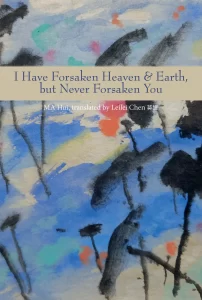By Mary Vlooswyk
I Have Forsaken Heaven & Earth, but Never Forsaken You
by MA Hui, translated by Leilei Chen
Frontenac House (2023)
Have you ever played the telephone game? The one where one person whispers in the ear of the person next to them, then they whisper to the next, until the last person shares what the message is? The fun lies in the transformation of the message as it is shared. Dalai Lama is a title given by the Tibetan people to their foremost spiritual leader of Tibetan Buddhism. I could not help wondering how the poetry of Dalai Lama Tsangyang Gyatso (1683 – 1706) may have been transformed by MA Hui and the passage of time.
Tsangyang was a controversial figure of religious history. He was a teenager acting like a typical teenager. He didn’t do as he was told, and when, at 19, he was supposed to take his final monastic vow, he refused. He chose to live his life as a Playboy. Many of his poems are written to the women he had relations with – from courtesans to beer girls at the market.
MA Hui, a contemporary Chinese Buddhist, did not actually translate the Dalai Lama’s poetry but chose to rewrite it in his native language of Mandarin, with careful consideration given “to address contemporary Chinese sensibilities.”
Leilei Chen is a contemporary Canadian poet who introduces Canadian literature to Mandarin readers, and modern contemporary Chinese writers to English readers, through translation. Mandarin is her first language. Thus, I hope you understand my reference to the telephone game was meant with no malice! I am pleased to tell you the resulting collection of poems in I Have Forsaken Heaven & Earth, but Never Forsaken You, is worth every twist and turn it had to go through to become the collection it is.
To begin, the reader can savour the beautiful cover, the abstract water colour on the front and the enticing blurbs by others on the back. Both an invitation to dive into words that “transcend time and place.” Mozhi Chen’s water colours also welcome the reader to contemplate each of the four sections of the book, The Nothingness of Earth, The Nothingness of Water, The Nothingness of Fire, and The Nothingness of Wind. These paintings provide the reader with a hint of the landscape they’re stepping into. Our worlds may be more alike than we think at first glance.
Spring sprouts green all the way to my pillow, and Heroes in the floating dust convey the turmoil of the young monk:
“Only the one who chooses the uphill path
Goes on walking towards death”
and
“I looked ahead
heroes in the floating dust one by one failed and fell”
The poems are rich with words that feed the senses: “women warrior calls,” “folk song melodies,” “scent of wild grass,” “a bowl of buttered tea,” “suddenly stung,” “a slender waist undulates,” “willow leaves wither,” to name a few.
The writing moves easily from the esoteric
“How many reincarnations would it take
to go from maturity to enlightenment” (Intractable knots are nothing to the young)
to the common
“The overfed only burp in the wind” (Who can transcend Lama’s chanting)
This collection is a representation of a young man’s inner world. Although he was a religious leader, he maintains a firm grasp on his humanity. He speaks of his connection with his followers in Many people choose the wrong entrance,
“I suddenly grasp kinship
Am I not one of them”
This collection of poems acknowledges loneliness and desire, a lived experience of love and heartbreak. They contain beautiful imagery, surrealism, ambiguities, and thematic paradoxes. When you read a book of poems, the point isn’t to love and understand everything inside that book. The point is to have your own experience as the poems do their work in you. These words emerge as an emotional resonance of someone who lived in the moment. A representation of hopes and fears for the future, carried from the past into today. Leilei Chen has introduced us to a collection that holds the mystery of an ancient monk’s words, worthy of the time and attention you can give it.
Mary Vlooswyk is a multimedia artist whose favourite colour is orange. Her writing has been shortlisted in contests, and published locally and internationally. Her poem, “An Origin Story,” recently won Gold at the Alberta Magazine Awards. Shanti Arts published her charcoal drawing, Surrender to the Wind, in March, 2023. She enjoys running and any activity that takes her outdoors. You may hear her play cello where she lives with her husband, on the edge of beautiful Fish Creek Park in Calgary, AB.
